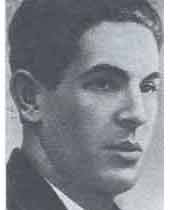Evgenii Birbraer was born in 1912 in Gomel, Belorussia. His father was a shoemaker. After graduating from school in 1927, he moved to Leningrad, where he worked as a factory worker. From 1932 to 1934, he studied at the Leningrad Institute of Journalism and, upon graduation, worked for a short time as a journalist. In 1936, Birbraier was drafted into the Red Army. He took part in the Soviet-Finnish Winter War of 1939-1940).
Birbraer's active service during the Soviet-German war began only in December 1941. With the rank of lieutenant and in the capacity of the commander of a mortar crew, he took part in the Moscow counter-offensive. In 1942 he graduated the Vystrel Higher Officer Courses and, in the capacity of commander of a mortar company, he returned to the front. Birbraer fought in the Battle of Stalingrad in the winter of 1942-43 and in the Battle of Kursk in July 1943. On the first day of the Battle of Kursk, July 5, his mortar company took the lead in the Soviet defense. At the end of September 1943, Birbraer's regiment took part in the forced crossing of the Dnieper River in the area of Dnepropetrovsk. Two companies, one of them commanded by Birbraer, established a bridgehead on the western side of Dnieper. The assignment of Birbraer's mortar company was to knock out enemy firing points and, thus, facilitate the crossing of the Dnieper by the rest of his regiment. On October 5-6, his company repulsed twelve enemy counter-attacks. Birbraer was killed on the second of these days. He was posthumously awarded with the title of Hero of the Soviet Union.







